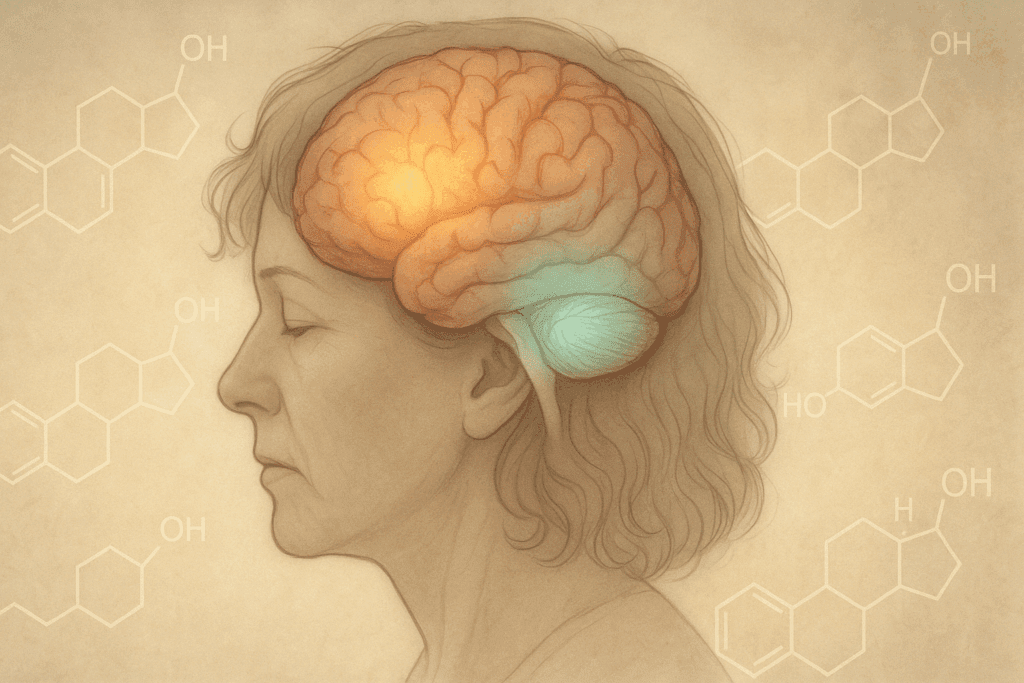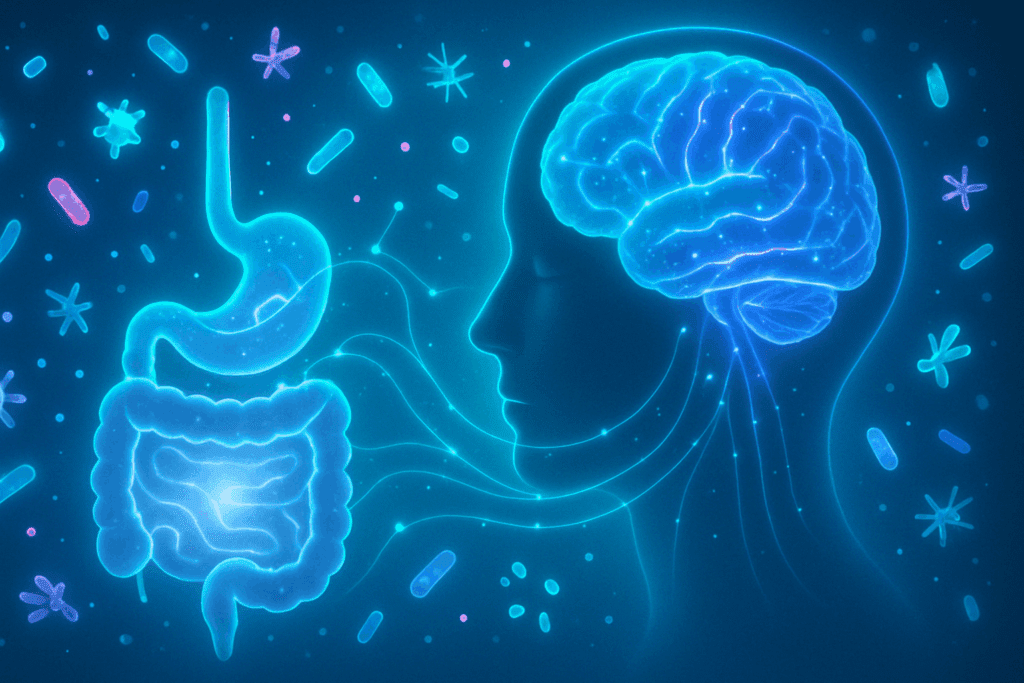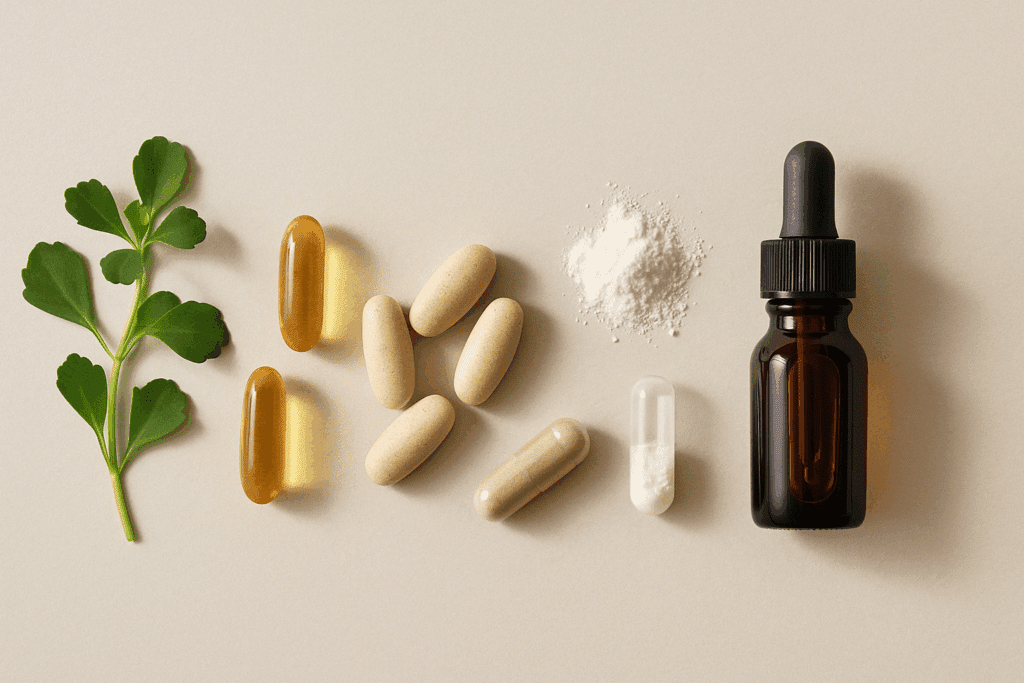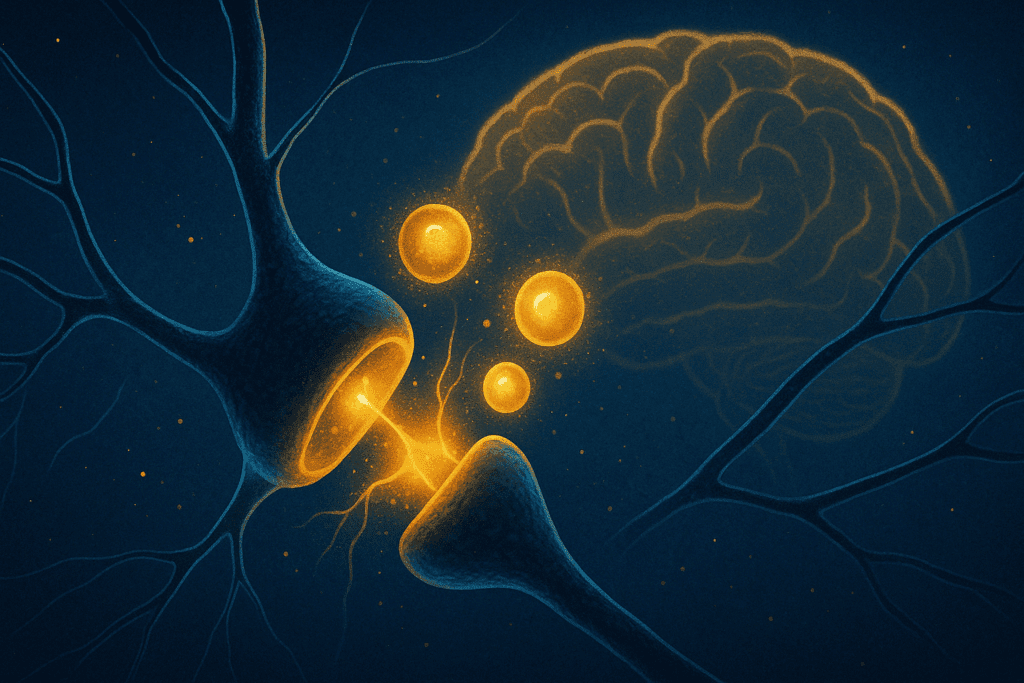As women approach midlife, many begin to notice subtle yet frustrating cognitive shifts—moments of forgetfulness, difficulty concentrating, or a foggy sense of disconnection from the mental clarity they once relied on. Often grouped under the umbrella term “menopause brain fog,” these experiences are not signs of decline but reflections of a powerful biological transition. Menopause brings a cascade of hormonal changes, particularly the decline in estrogen, which influences not only reproductive health but also brain function. As these shifts take place, it’s no surprise that many women begin seeking the best supplements for menopause brain fog, hoping to regain focus, mental energy, and sharpness.
You may also like: How to Choose the Best Brain Supplements for Adults: Science-Backed Ingredients That Support Focus, Memory, and Mental Clarity
Modern neuroscience and nutritional research are now offering promising insights into how targeted supplementation can support cognitive resilience during menopause. But navigating the growing market of brain-boosting products can be overwhelming—especially when emotional and mental clarity feel just out of reach. This article takes a research-informed, compassionate, and practical approach to explore the natural remedies for menopause brain fog that may offer relief and renewed cognitive energy. From established vitamins to cutting-edge nootropics, we’ll explore how specific supplements for menopause brain fog are helping many women experience clearer thinking, better memory, and more confident decision-making during this important phase of life.

Understanding Menopause Brain Fog: What’s Really Going On?
Menopause is a natural life stage, but it can be accompanied by a complex range of physiological and psychological symptoms—many of which stem from hormonal fluctuations. One of the most underappreciated effects is the impact on cognitive function. Brain fog during menopause is often characterized by forgetfulness, difficulty multitasking, mental fatigue, and reduced concentration. While these symptoms are not clinically defined in the same way as dementia or neurological disease, they are no less real and can significantly impact daily life.
The drop in estrogen plays a central role. Estrogen receptors are widely distributed throughout the brain, particularly in regions involved in memory, attention, and executive function. As estrogen levels decline, neurotransmitter systems such as serotonin, dopamine, and acetylcholine can also be affected, leading to disruptions in neural communication. These neurochemical shifts are thought to underlie the cognitive sluggishness and mental fatigue many women report. Sleep disturbances and increased stress levels, which are also common in midlife, may further exacerbate these symptoms.
It’s important to note that supplements for memory loss during menopause are not intended as miracle cures. Rather, when chosen wisely and used consistently, the right supplements may work synergistically with lifestyle strategies—such as improved sleep hygiene, stress reduction, and exercise—to support neuroplasticity and restore mental clarity.
The Role of Nutrition and Brain Health in Menopausal Cognition
Nutrition has long been linked to brain health, and for women in midlife, this connection becomes even more critical. A well-nourished brain is more resilient to stress and hormonal shifts. Certain nutrients act as cofactors in neurotransmitter synthesis, others combat oxidative stress, and many support the structural integrity of neurons. During menopause, when the brain is adapting to new hormonal norms, it becomes especially important to ensure these nutrients are readily available.
Omega-3 fatty acids, for example, are vital for maintaining cell membrane fluidity in the brain and have been shown to support mood and memory. B vitamins, particularly B6, B9 (folate), and B12, are essential for methylation processes that regulate gene expression and neurochemical balance. Antioxidants such as vitamin C, vitamin E, and polyphenols protect brain tissue from inflammation and free radical damage—both of which can be heightened during menopause.
This is where natural remedies for menopause brain fog can offer support. While a nutrient-rich diet should be the foundation, supplements provide a way to bridge the gap—especially when specific nutrients become depleted or hard to absorb. Notably, menopausal changes can also alter gut health and nutrient absorption, which may further justify a targeted supplementation strategy.

Top Supplements for Menopause Brain Fog and Cognitive Support
A number of well-researched supplements show promise for alleviating cognitive symptoms during menopause. While not every supplement works for every individual, a growing body of clinical evidence suggests several options that may help.
One of the most widely recommended supplements for menopause brain fog is phosphatidylserine. This phospholipid is a critical component of cell membranes in the brain and plays a key role in communication between neurons. Supplementing with phosphatidylserine has been shown to improve memory, mental clarity, and attention in both aging populations and those under chronic stress. Its neuroprotective properties make it an appealing option for menopausal women navigating cognitive changes.
Another noteworthy supplement is Bacopa monnieri, an adaptogenic herb traditionally used in Ayurvedic medicine to enhance cognition. Bacopa supports memory consolidation, learning, and processing speed. Clinical studies suggest it may help reduce the mental fatigue and sluggishness that often accompany hormonal transitions. For women seeking natural remedies for menopause brain fog, Bacopa is a gentle yet effective botanical option.
Acetyl-L-carnitine is another compound that has gained popularity. It supports mitochondrial function, helping to produce energy within brain cells. Several studies have demonstrated its ability to improve alertness and cognitive performance, particularly in individuals experiencing brain fog or fatigue. By enhancing the energy supply to the brain, acetyl-L-carnitine may help menopausal women feel more mentally present and focused.
How B Vitamins Help with Memory and Clarity During Menopause
Among the most effective supplements for memory loss during menopause, B vitamins stand out for their multifaceted support of brain health. B6, B9, and B12 are especially important for regulating homocysteine levels—an amino acid that, when elevated, has been linked to cognitive decline. These vitamins also play a key role in producing neurotransmitters like serotonin and dopamine, which influence mood, motivation, and concentration.
Menopause can lead to increased stress, disrupted sleep, and even mild depressive symptoms, all of which compound the experience of brain fog. B-complex supplementation can provide foundational support in these areas, helping to stabilize mood and sharpen mental acuity. Many women find that after several weeks of consistent supplementation, they begin to notice not only improved memory recall but also a greater sense of emotional balance and mental stamina.
Additionally, B12 deficiency is common in older adults, including menopausal women, due to changes in gastric acid production that impair absorption. Supplementing with methylcobalamin—a bioactive form of B12—ensures this vital nutrient is readily usable by the brain. It’s a simple yet powerful addition to any natural remedy for menopause brain fog protocol.

Adaptogens and Herbal Support for Mental Resilience
Adaptogens are herbs that help the body adapt to stress and restore equilibrium. During menopause, when both physical and emotional stress levels tend to increase, adaptogens can provide a buffering effect—helping the brain and body maintain balance. One of the most popular adaptogens for cognitive support is Rhodiola rosea. Research suggests it enhances mental performance under stress and can reduce feelings of mental fatigue and burnout.
Ashwagandha, another well-known adaptogen, has been used for centuries to support cognitive function and emotional regulation. In modern studies, it has demonstrated anxiolytic (anxiety-reducing) and neuroprotective properties. For menopausal women experiencing overwhelm or irritability along with cognitive symptoms, ashwagandha offers a dual benefit—soothing the nervous system while enhancing mental clarity.
Ginkgo biloba also deserves mention. While research results have been mixed, some studies show that Ginkgo may improve circulation to the brain, enhance short-term memory, and reduce mental confusion in aging populations. As part of a comprehensive stack of supplements for menopause brain fog, Ginkgo may support sharper thinking and quicker mental processing.
The Influence of Gut Health on Cognitive Clarity
Emerging research increasingly points to the gut-brain connection as a key factor in cognitive health. The gut microbiome plays a pivotal role in regulating inflammation, producing neurotransmitters, and modulating the immune response—all of which impact brain function. For menopausal women, shifts in estrogen levels can alter gut bacteria composition, leading to dysbiosis and increased inflammation, which may worsen brain fog.
Probiotics and prebiotics are becoming popular as natural remedies for menopause brain fog, not just for digestive benefits but also for their effects on mood and cognition. Certain strains of probiotics, such as Lactobacillus rhamnosus and Bifidobacterium longum, have shown potential in reducing anxiety, supporting memory, and modulating stress responses.
Incorporating a high-quality probiotic supplement or fermented foods into a menopause support plan may improve overall mental well-being. When combined with brain-targeting nutrients, this gut-focused approach enhances the effectiveness of other supplements for menopause brain fog by addressing systemic inflammation and promoting holistic balance.
Lifestyle and Supplement Synergy: Building a Cognitive Wellness Routine
While supplements can be powerful allies, they are most effective when paired with lifestyle strategies that reinforce cognitive health. Sleep is a foundational factor, and during menopause, disrupted sleep due to night sweats or insomnia is common. Melatonin supplementation may offer short-term relief, but deeper interventions—such as mindfulness practices, regular physical activity, and stress reduction—are often necessary to restore natural sleep rhythms.
Physical exercise, particularly aerobic activity, has been shown to enhance neurogenesis and improve executive function. Even modest increases in daily movement can improve blood flow to the brain and reduce symptoms of fog and forgetfulness. Cognitive training, whether through puzzles, learning new skills, or engaging in complex conversations, helps maintain neuroplasticity.
When supplements are used alongside these practices, their impact multiplies. For example, taking omega-3s alongside a Mediterranean-style diet rich in antioxidants enhances absorption and reinforces anti-inflammatory effects. Similarly, adaptogens may work better in individuals who are actively addressing their stress levels through journaling, yoga, or social connection.
Creating a wellness routine that integrates supplements for memory loss during menopause, sleep hygiene, cognitive stimulation, and emotional self-care is one of the most powerful ways to navigate the mental challenges of menopause with grace and resilience.

Safety Considerations and Individual Variability
Before starting any new supplement regimen, especially during a life stage as dynamic as menopause, it’s essential to consult with a healthcare provider. While many of the supplements discussed here are generally regarded as safe, interactions with medications, underlying health conditions, and individual sensitivities must be taken into account.
Women with thyroid conditions, for example, should be cautious with ashwagandha, which may influence thyroid hormone levels. Similarly, those taking blood thinners may need to avoid high doses of Ginkgo biloba due to its blood-thinning properties. B vitamin supplements can sometimes cause overstimulation or digestive discomfort if not dosed properly, especially in individuals with MTHFR gene mutations.
A personalized approach is key. Blood testing, genetic screenings, and symptom tracking can help determine which supplements for menopause brain fog are most appropriate for each individual. Working with a functional medicine practitioner or an integrative health specialist can provide tailored guidance that maximizes safety and results.
Frequently Asked Questions (FAQ): Supplements and Natural Remedies for Menopause Brain Fog
1. Can lifestyle changes enhance the effects of supplements for menopause brain fog?
Absolutely. While the best supplements for menopause brain fog can support cognitive function, their effects are significantly amplified when paired with intentional lifestyle habits. For instance, cognitive behavioral therapy (CBT) has shown promise in helping women reframe stress responses that worsen brain fog. Regular aerobic exercise, even as little as 30 minutes a day, has been shown to enhance neuroplasticity and improve memory retention during hormonal fluctuations. Moreover, limiting alcohol and processed sugars—both known to impair executive function—can help the brain better respond to natural interventions. Sleep quality, too, plays a pivotal role in whether supplements for memory loss during menopause work effectively or fall short.
2. How does chronic stress influence menopause brain fog, even when using supplements?
Chronic stress directly impacts the hippocampus and prefrontal cortex, the brain regions most involved in memory and focus. When cortisol levels remain high for extended periods, it can blunt the effectiveness of even the best supplements for menopause brain fog. Stress can also disrupt nutrient absorption in the gut, meaning supplements like B vitamins or magnesium may not metabolize properly. Mindfulness-based interventions and adaptogenic herbs like Rhodiola or Ashwagandha—often overlooked in conventional supplement plans—can buffer the neurochemical effects of stress. For women navigating intense stress during menopause, combining natural remedies for menopause brain fog with stress-reduction strategies is not just beneficial but often necessary for noticeable results.
3. Are there overlooked nutritional deficiencies that worsen menopause brain fog?
Yes, several often-overlooked micronutrient deficiencies can exacerbate cognitive issues during menopause. One common example is choline—a precursor to acetylcholine, a neurotransmitter essential for memory—which is frequently under-consumed, especially in plant-based diets. Deficiencies in vitamin D, selenium, and omega-3 fatty acids can also dampen the brain’s ability to process information efficiently. While the best supplements for menopause brain fog often include magnesium and B-complex vitamins, personalized lab testing can uncover less obvious deficiencies. Addressing these nutritional gaps can dramatically enhance the efficacy of broader supplements for memory loss during menopause and lead to more sustained cognitive clarity.
4. Can gut health impact how well menopause brain fog supplements work?
Emerging research suggests a strong gut-brain connection, particularly relevant during hormonal transitions. The microbiome plays a key role in metabolizing nutrients, neurotransmitter synthesis, and inflammation regulation—all vital to brain health. If your gut is imbalanced due to dysbiosis or leaky gut syndrome, even high-quality supplements for menopause brain fog may not be properly absorbed. Including probiotics and prebiotic-rich foods alongside natural remedies for menopause brain fog can support more effective results. Additionally, some women report enhanced mental clarity after addressing food sensitivities like gluten or dairy, which are known to trigger inflammation that may contribute to cognitive symptoms.
5. How do bioidentical hormones compare to supplements for menopause brain fog?
Bioidentical hormone replacement therapy (BHRT) offers a more direct approach to replenishing declining estrogen and progesterone levels, which play roles in cognition. However, not every woman is a candidate for hormone therapy due to risks such as blood clots or breast cancer. In such cases, natural remedies for menopause brain fog—including phytoestrogens from plants like red clover or black cohosh—may serve as safer alternatives. Unlike BHRT, these supplements typically take longer to show results but carry fewer systemic side effects. Integrating supplements for memory loss during menopause with lower-risk hormonal support may be a middle path for those who prefer a holistic but effective approach.

6. Are there brain training techniques that enhance the impact of menopause supplements?
Yes, cognitive training—particularly tasks involving working memory and executive function—can synergize with supplements for menopause brain fog to create longer-lasting results. Apps like BrainHQ and Lumosity or even analog methods like crossword puzzles and logic games can reinforce neural pathways that menopause may weaken. These activities are especially beneficial when performed shortly after taking supplements, as some ingredients (like alpha GPC or ginkgo biloba) have peak absorption windows. Women who combine brain training with natural remedies for menopause brain fog often report greater day-to-day improvements in mental clarity. Consistency, however, is key: short daily sessions often outperform sporadic, intensive efforts.
7. What role do adaptogens play in managing menopause-related cognitive decline?
Adaptogens such as Panax ginseng, Ashwagandha, and holy basil are increasingly featured in the best supplements for menopause brain fog due to their dual action on stress regulation and cognitive enhancement. These herbs help stabilize the hypothalamic-pituitary-adrenal (HPA) axis, which is often overstimulated during hormonal shifts. By lowering cortisol levels and supporting neurotransmitter balance, adaptogens can indirectly improve focus, memory, and emotional resilience. They’re especially useful for women who experience “wired but tired” symptoms that make both thinking clearly and falling asleep difficult. Pairing adaptogens with supplements for memory loss during menopause may offer more comprehensive support than using either approach alone.
8. Are there risks to combining multiple supplements for menopause brain fog?
Yes, layering too many supplements—especially without professional guidance—can backfire. Some ingredients in the best supplements for menopause brain fog, like ginkgo or St. John’s Wort, may interact with prescription medications or amplify side effects like headaches or digestive issues. Additionally, overuse of high-dose B vitamins can lead to nerve issues in sensitive individuals. It’s essential to evaluate not only ingredient interactions but also overlapping dosages, which can lead to nutrient imbalances. A phased, “one-change-at-a-time” approach, ideally supervised by a qualified practitioner, is the safest way to explore natural remedies for menopause brain fog effectively.
9. How long does it typically take to see results from supplements for memory loss during menopause?
Most women report subtle improvements within 2–4 weeks, but more pronounced benefits from supplements for memory loss during menopause may take 8–12 weeks. The timeline depends on several factors: age, baseline cognitive health, diet, sleep, and the type of supplement used. Fast-acting nootropics like citicoline or acetyl-L-carnitine may offer quicker mental clarity, while adaptogens and hormonal balancing herbs often take longer to reach full efficacy. It’s also worth noting that women who take supplements alongside lifestyle modifications—like regular exercise and sleep hygiene—tend to see results more quickly and sustainably. Tracking symptoms in a journal can help measure progress and adjust protocols accordingly.
10. What future innovations are on the horizon for managing menopause brain fog?
The next frontier includes personalized nootropics powered by genetic testing and AI-based cognitive trackers. Companies are already developing targeted blends of supplements for menopause brain fog based on a woman’s unique hormonal profile, nutrient absorption patterns, and even microbiome sequencing. In the realm of neurotech, wearable EEG devices that measure brain activity in real-time could offer feedback on how well a supplement or natural remedy for menopause brain fog is working. Additionally, advances in nanoencapsulation may allow nutrients to bypass digestion and deliver ingredients directly to the brain more efficiently. As research continues to demystify the menopause-cognition connection, we can expect increasingly precise and evidence-based tools for managing this complex life stage.

Closing Reflections: Finding Mental Clarity Through Supplement Support in Midlife
For many women, menopause marks a pivotal moment of both challenge and opportunity. While the fog of fluctuating hormones can sometimes feel disorienting, it is also a time to reconnect with the body’s changing needs and to cultivate new tools for thriving in the decades ahead. The growing field of nootropics and nutritional neuroscience offers a wealth of options for those seeking the best supplements for menopause brain fog, giving women real, evidence-based strategies to reclaim mental clarity and cognitive strength.
Rather than viewing brain fog as an inevitable decline, it helps to see it as a signal—a call to re-evaluate, to nourish, and to support the brain in new ways. Natural compounds such as phosphatidylserine, acetyl-L-carnitine, and Bacopa provide targeted neuroprotective support, while B vitamins and adaptogens offer foundational resilience. When combined with mindful lifestyle practices and gut health support, these supplements for menopause brain fog can help restore not only focus and memory but also a deeper sense of cognitive confidence.
The path to mental clarity during menopause is not one-size-fits-all. But through research-backed strategies, personalized care, and an open mindset, women can find their own formula for thriving—both mentally and emotionally—through this powerful chapter of life. With the right supplements for memory loss during menopause, paired with conscious self-care, the fog can begin to lift, revealing a new kind of brilliance that was there all along.
Was this article helpful? Don’t let it stop with you. Share it right now with someone who needs to see it—whether it’s a friend, a colleague, or your whole network. And if staying ahead on this topic matters to you, subscribe to this publication for the most up-to-date information. You’ll get the latest insights delivered straight to you—no searching, no missing out.
Further Reading:
How to Handle Menopause Brain Fog
Supplements, herbal remedies and vitamins for menopause brain fog


